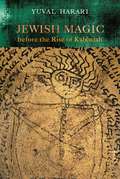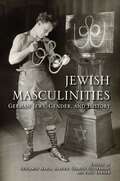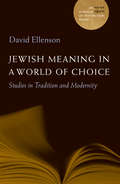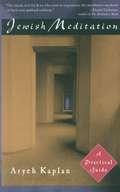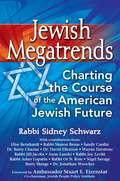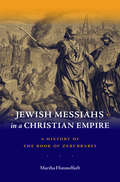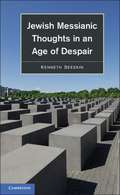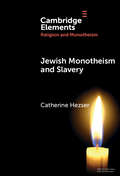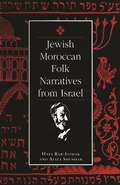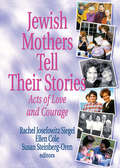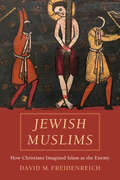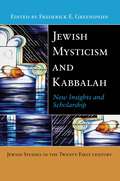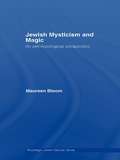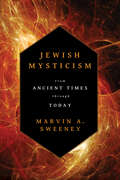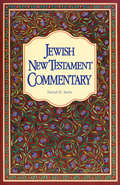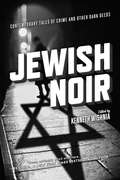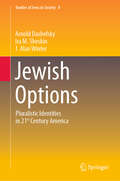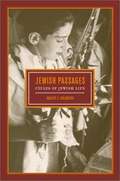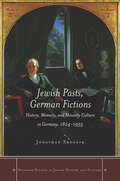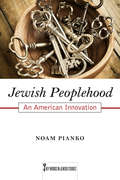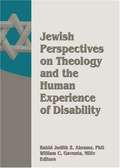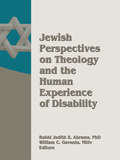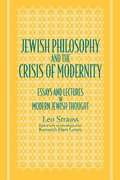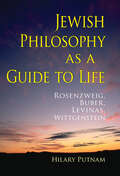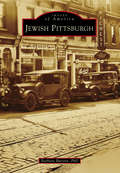- Table View
- List View
Jewish Magic before the Rise of Kabbalah (Raphael Patai Series in Jewish Folklore and Anthropology)
by Yuval Harari“Magic culture is certainly fascinating. But what is it? What, in fact, are magic writings, magic artifacts?” Originally published in Hebrew in 2010, Jewish Magic Before the Rise of Kabbalah is a comprehensive study of early Jewish magic focusing on three major topics: Jewish magic inventiveness, the conflict with the culture it reflects, and the scientific study of both. The first part of the book analyzes the essence of magic in general and Jewish magic in particular. The book begins with theories addressing the relationship of magic and religion in fields like comparative study of religion, sociology of religion, history, and cultural anthropology, and considers the implications of the paradigm shift in the interdisciplinary understanding of magic for the study of Jewish magic. The second part of the book focuses on Jewish magic culture in late antiquity and in the early Islamic period. This section highlights the artifacts left behind by the magic practitioners—amulets, bowls, precious stones, and human skulls—as well as manuals that include hundreds of recipes. Jewish Magic before the Rise of Kabbalah also reports on the culture that is reflected in the magic evidence from the perspective of external non-magic contemporary Jewish sources. Issues of magic and religion, magical mysticism, and magic and social power are dealt with in length in this thorough investigation. Scholars interested in early Jewish history and comparative religions will find great value in this text.
Jewish Masculinities: German Jews, Gender, and History
by Benjamin Maria Baader, Sharon Gillerman, and Paul LernerStudies exploring the history of the German-Jewish male identity from the sixteenth to twentieth centuries, across a myriad of societal occupations.Stereotyped as delicate and feeble intellectuals, Jewish men in German-speaking lands in fact developed a rich and complex spectrum of male norms, models, and behaviors. Jewish Masculinities explores conceptions and experiences of masculinity among Jews in Germany from the sixteenth through the late twentieth century as well as emigrants to North America, Palestine, and Israel. The volume examines the different worlds of students, businessmen, mohels, ritual slaughterers, rabbis, performers, and others, shedding new light on the challenge for Jewish men of balancing German citizenship and cultural affiliation with Jewish communal solidarity, religious practice, and identity.“A valuable addition to the growing field of Jewish gender history.” —Derek Penslar, University of Toronto“[This book] assembles innovative, vivid, and inspiring inquiries into the intersection of Jewish history, German history, and gender history. By focusing on the male side of Jewish gender history . . . [this] book establishes a new field, profiting from a broad range of never (or rarely) before used primary sources, such as memoirs, letters, interviews, and obscure tabloids.” —German Studies Review, May 2014“[A]n excellent introduction to the Zionist remasculinization of the Jewish male.” —H-Judaic, February 2015“[I]nsightful, innovative and largely entertaining. . . . [T]his volume makes a very valuable and original contribution to German-Jewish history.” —German History“Historians of central Europe will be enriched by the interrogations of “theory” along with excavations of little-known yet critical avenues of Jewish history in this excellent volume.” —Central European History
Jewish Meaning in a World of Choice: Studies in Tradition and Modernity (A JPS Scholar of Distinction Book #9)
by Rabbi David EllensonInternationally recognized scholar David Ellenson shares twenty-three of his most representative essays, drawing on three decades of scholarship and demonstrating the consistency of the intellectual-religious interests that have animated him throughout his lifetime. These essays center on a description and examination of the complex push and pull between Jewish tradition and Western culture. Ellenson addresses gender equality, women’s rights, conversion, issues relating to who is a Jew, the future of the rabbinate, Jewish day schools, and other emerging trends in American Jewish life. As an outspoken advocate for a strong Israel that is faithful to the democratic and Jewish values that informed its founders, he also writes about religious tolerance and pluralism in the Jewish state. The former president of Hebrew Union College–Jewish Institute of Religion, the primary seminary of the Reform movement, Ellenson is widely respected for his vision of advancing Jewish unity and of preparing leadership for a contemporary Judaism that balances tradition with the demands of a changing world. Scholars and students of Jewish religious thought, ethics, and modern Jewish history will welcome this erudite collection by one of today’s great Jewish leaders.
Jewish Meditation: A Practical Guide
by Aryeh KaplanStudents of mediation are usually surprised to discover that a Jewish mediation tradition exists and that it was an authentic and integral part of mainstream Judaism until the eighteenth century. Jewish Meditation is a step-by-step introduction to meditation and the Jewish practice of meditation in particular. This practical guide covers such topics as mantra meditation, contemplation, and visualization within a Jewish context. It shows us how to use meditative techniques to enhance prayer using the traditional liturgy--the Amidah and the Shema. Through simple exercises and clear explanations of theory, Rabbi Kaplan gives us the tools to develop our spiritual potential through an authentically Jewish meditative practice.
Jewish Megatrends: Charting the Course of the American Jewish Future
by Rabbi Sidney SchwarzThe American Jewish community is riddled with doubts about the viability of the institutions that well served the Jewish community of the twentieth century. Synagogues, Federations and Jewish membership organizations have yet to figure out how to meet the changing interests and needs of the next generation.
Jewish Messiahs in a Christian Empire: A History of the Book of Zerubbabel
by Martha HimmelfarbThe seventh-century CE Hebrew work Sefer Zerubbabel (Book of Zerubbabel)—a tale of two messiahs—is the first full-fledged messianic narrative in Jewish literature. Martha Himmelfarb offers a comprehensive analysis of this rich understudied text, illuminating its distinctive literary features and the complex milieu from which it arose.
Jewish Messianic Thoughts in an Age of Despair
by Kenneth SeeskinBelief in the coming of a Messiah poses a genuine dilemma. From a Jewish perspective, the historical record is overwhelmingly against it. If, despite all the tragedies that have befallen the Jewish people, no legitimate Messiah has come forward, has the belief not been shown to be groundless? Yet for all the problems associated with messianism, the historical record also shows it is an idea with enormous staying power. The prayer book mentions it on page after page. The great Jewish philosophers all wrote about it. Secular thinkers in the twentieth century returned to it and reformulated it. And victims of the Holocaust invoked it in the last few minutes of their life. This book examines the staying power of messianism and formulates it in a way that retains its redemptive force without succumbing to mythology.
Jewish Monotheism and Slavery (Elements in Religion and Monotheism)
by Catherine HezserBiblical monotheism imagines God as a slave master who owns and has total control over humans as his slaves, who are expected to show obedience to him. The theological use of slavery metaphors has a limited value, however, and is deeply problematic from the perspective of real-life slave practices. Ancient authors already supplemented the metaphor of God as a slave master with other images and emphasized God's difference from human slave owners. Ancient and modern experiences of and attitudes toward slavery determined the understanding and applicability of the slavery metaphors. This Element examines the use of slavery metaphors in ancient Judaism and Christianity in the context of the social reality of slavery, modern abolitionism, and historical-critical approaches to the ancient texts.
Jewish Moroccan Folk Narratives from Israel (Raphael Patai Series in Jewish Folklore and Anthropology)
by Haya Bar-Itzhak Aliza ShenharJewish Moroccan Folk Narratives focuses on two central elements: textual research to examine the aesthetic qualities of the narrative, their division into genres, the various versions and their parallels, and acculturation in Israel, as well as contextual research to examine the performance art of the narrator and the role of the narrative as a communicative process in the narrating society. The collection includes twenty-one narratives by twelve storytellers; an account of the narrators' lives and a commentary have been applied to each. In contrast to most anthologies of Jewish folktales, the texts in this book were recorded in the natural context of narration and in the language of origin (Judaeo-Arabic), meeting the most vigorous standards of current folklore scholarship.
Jewish Mothers Tell Their Stories: Acts of Love and Courage
by Ellen Cole Rachel J Siegel Susan Steinberg OrenWinner of the Women in Psychology Jewish Caucus Award for 2000!Jewish Mothers Tell Their Stories: Acts of Love and Courage contains touching and personal essays written by contemporary Jewish mothers from different parts of the globe. Their stories reveal the choices that Jewish mothers make in our post-Holocaust, non-Jewish world--the many ways of being Jewish, the acts of loving, of preserving and celebrating Jewish traditions and spirituality, and of transmitting them to their children and families. The firsthand stories in this compelling book raises questions and provides you with insight into a variety of topics, including: The 'Jewish mother’stereotype and its impact on real Jewish mothers ethnic/historical connections between mothers and daughters moving acts of love, courage, and sacrifice in response to illness, war, or conflicting ideologies motherhood as a catalyst for personal evolutions of Jewish identity and values Orthodox to secular expressions of spirituality The impact of the 'Jewish motherhood imperative’ positive experiences of conversion and interfaith families conveying Jewish history and tradition in a Christian worldJewish Mothers Tell Their Stories will draw you into an appreciation of the cultural, ethnic, and spiritual aspects of mothering. This remarkable collection explores the different meanings of today's concept of “Jewish mother” and “Jewish family.”
Jewish Muslims: How Christians Imagined Islam as the Enemy
by David M. FreidenreichUncovering the hidden history of Islamophobia and its surprising connections to the long-standing hatred of Jews. Hatred of Jews and hatred of Muslims have been intertwined in Christian thought since the rise of Islam. In Jewish Muslims, David M. Freidenreich explores the history of this complex, perplexing, and emotionally fraught phenomenon. He makes the compelling case that, then and now, hate-mongers target "them" in an effort to define "us." Analyzing anti-Muslim sentiment in texts and images produced across Europe and the Middle East over a thousand years, the author shows how Christians intentionally distorted reality by alleging that Muslims were just like Jews. They did so not only to justify assaults against Muslims on theological grounds but also to motivate fellow believers to live as "good" Christians. The disdain premodern polemicists expressed for Islam and Judaism was never really about these religions. Rather, they sought to promote their own visions of Christianity—a dynamic that similarly animates portrayals of Muslims and Jews today.
Jewish Mysticism and Kabbalah: New Insights and Scholarship (Jewish Studies in the 21st Century #2)
by Frederick E GreenspahnInformative and accessible essays exploring contemporary scholarship in Jewish mysticism and Kabbalah.“This carefully edited collection of essays on Jewish mysticism effectively delivers on its promise to be accessible to broad audiences. The volume amounts to a thoughtful and lucid conversation among leading scholars. . . . The literate lay reader as well as faculty and students in a wide range of university courses will find this to be a most useful gateway to Jewish mysticism as well as an illumining account of current trends in scholarship.” —Jeremy Zwelling, Wesleyan UniversityOver the past generation, scholars have devoted increasing attention to the diverse forms that Jewish mysticism has taken both in the past and today: what was once called “nonsense” by Jewish scholars has generated important research and attention both within the academy and beyond, as demonstrated by the popular fascination with figures such as Madonna and Demi Moore and the growing interest in spirituality.In Jewish Mysticism and Kabbalah, leading experts introduce the history of this scholarship as well as the most recent insights and debates that currently animate the field in a way that is accessible to a broad audience. From mystical outpourings in ancient Palestine to the Kabbalah Centre, and from attitudes towards gender to mystical contributions to Jewish messianic movements, this volume explores the various expressions of Jewish mysticism from antiquity to the present day in an engaging style appropriate for students and non-specialists alike.“Refreshingly summarizes much of the current thinking about mysticism in general and Kabbalah in particular. The essays are thoughtful, provocative, and frequently even inspiring.” —Lawrence Kushner, author of I’m God, You’re Not“This is an excellent book for general readers who wish to learn about this fascinating area of Jewish life and literature, as the jargon of scholar-speak is kept to a minimum.” —Jewish Book Council
Jewish Mysticism and Magic: An Anthropological Perspective (Routledge Jewish Studies Series)
by Maureen BloomProviding a unique anthropological perspective on Jewish mysticism and magic, this book is a study of Jewish rites and rituals and how the analysis of early literature provides the roots for understanding religious practices. It includes analysis on the importance of sacrifice, amulets, and names, and their underlying cultural constructs and the persistence of their symbolic significance.
Jewish Mysticism: From Ancient Times through Today
by Marvin A. SweeneyQuestions of how the divine presence is understood and interacts within the world have been around since the time of the biblical prophets. The Jewish mystical tradition conceives God as active, just, powerful, and present while allowing for divine limitation so as to understand the relationship between G-d and the Jewish people in their history. Jewish Mysticism surveys Jewish visionary and mystical experience from biblical and ancient Near Eastern times through the modern period and the emergence of modern Hasidism. Marvin Sweeney provides a comprehensive treatment of one of the most dynamic fields of Jewish studies in the twenty-first century, providing an accessible overview of texts and interpretative issues. Sweeney begins with the biblical period, which most treatments of Jewish mysticism avoid, and includes chapters on the ancient Near East, the Pentateuch, the Former Prophets and Psalms, the Latter Prophets, Jewish Apocalyptic, the Heikhalot Literature, the Sefer Yetzirah and early Kabbalistic Literature, the Zohar, Lurianic Kabbalah and the Shabbetean Movement, and the Hasidic Movement. Placing Jewish apocalyptic literature into the larger development of ancient Jewish visionary and mystical experience, Sweeney fills gaps left by the important but outdated work of others in the field. Ideal for the scholar, student, or general reader, Jewish Mysticism provides readers with a fresh understanding of the particular challenges, problems, needs, and perspectives of Judaism throughout its history.
Jewish New Testament Commentary: A Companion Volume To The Jewish New Testament
by David H. SternDrawing on years of research, Dr. Stern relates the New Testament text to the Tanakh (Old Testament), to the historical setting, to rabbinic materials and Christian theology. He answers questions Jewish people have about Yeshua, the New Testament, and Christianity; questions Christians have about Judaism and the Jewish roots of their faith; and questions Messianic Jews have about being both Jewish and Messianic.
Jewish Noir: Contemporary Tales of Crime and Other Dark Deeds
by Kenneth WishniaA unique collection of all-new stories by award-winning authors. This anthology includes the work of numerous authors such as Marge Piercy, Harlan Ellison, S. J. Rozan, Nancy Richler, Moe Prager (Reed Farrel Coleman), Wendy Hornsby, Charles Ardai, and Kenneth Wishnia. The stories explore such issues as the Holocaust and its long-term effects on subsequent generations, anti-Semitism in the mid- and late-20th-century United States, and the dark side of the Diaspora (e.g., the decline of revolutionary fervor, the passing of generations, the Golden Ghetto, etc.). The stories in this collection include "Trajectories," Marge Piercy's story of the divergent paths taken by two young men from the slums of Cleveland and Detroit in a rapidly changing post–WW II society; "Some You Lose," Nancy Richler's empathetic exploration of the emotional and psychological challenges of trying to sum up a man's life in a eulogy; and "Yahrzeit Candle," Stephen Jay Schwartz's take on the subtle horrors of the inevitable passing of time. These works include many "teachable moments" about the history of prejudice, the contradictions of ethnic identity, and assimilation into American society and culture.
Jewish Options: Pluralistic Identities in 21st Century America (Studies of Jews in Society #8)
by Arnold Dashefsky Ira M. Sheskin J.Alan WinterThis book offers an examination of an expanding set of options for being Jewish in contemporary American society. It examines the evolution of Jewish identity across five epochs of Jewish civilization as well as the transformation of the American Jewish experience across four centuries. In addition, an institutional history and a geographic, demographic, and religious profile of American Jews are presented, including an outline of contemporary Jewish options to express Jewish identity in twenty-first century America. Readers will gain an understanding of how these options developed via the provision of a socio-historical and a social scientific analysis of each option in one integrated volume. The book also discusses contemporary challenges to the continuity of American Jewish community and identity including the issues of education, interfaith marriage, and philanthropy.
Jewish Passages: Cycles of Jewish Life
by Harvey E. GoldbergThis book is both comprehensive and accessible, making Jewish customs meaningful even to non-specialists. A scholarly achievement with tremendous value for anyone in Jewish Studies including rabbis and members of synagogue study groups.
Jewish Pasts, German Fictions: History, Memory, and Minority Culture in Germany, 1824-1955
by Jonathan SkolnikJewish Pasts, German Fictions is the first comprehensive study of how German-Jewish writers used images from the Spanish-Jewish past to define their place in German culture and society. Jonathan Skolnik argues that Jewish historical fiction was a form of cultural memory that functioned as a parallel to the modern, demythologizing project of secular Jewish history writing. What did it imply for a minority to imagine its history in the majority language? Skolnik makes the case that the answer lies in the creation of a German-Jewish minority culture in which historical fiction played a central role. After Hitler's rise to power in 1933, Jewish writers and artists, both in Nazi Germany and in exile, employed images from the Sephardic past to grapple with the nature of fascism, the predicament of exile, and the destruction of European Jewry in the Holocaust. The book goes on to show that this past not only helped Jews to make sense of the nonsense, but served also as a window into the hopes for integration and fears about assimilation that preoccupied German-Jewish writers throughout most of the nineteenth century. Ultimately, Skolnik positions the Jewish embrace of German culture not as an act of assimilation but rather a reinvention of Jewish identity and historical memory.
Jewish Peoplehood
by Noam PiankoAlthough fewer American Jews today describe themselves as religious, they overwhelmingly report a strong sense of belonging to the Jewish people. Indeed, Jewish peoplehood has eclipsed religion--as well as ethnicity and nationality--as the essence of what binds Jews around the globe to one another. In Jewish Peoplehood, Noam Pianko highlights the current significance and future relevance of "peoplehood" by tracing the rise, transformation, and return of this novel term. The book tells the surprising story of peoplehood. Though it evokes a sense of timelessness, the term actually emerged in the United States in the 1930s, where it was introduced by American Jewish leaders, most notably Rabbi Stephen Wise and Rabbi Mordecai Kaplan, with close ties to the Zionist movement. It engendered a sense of unity that transcended religious differences, cultural practices, geographic distance, economic disparity, and political divides, fostering solidarity with other Jews facing common existential threats, including the Holocaust, and establishing a closer connection to the Jewish homeland. But today, Pianko points out, as globalization erodes the dominance of nationalism in shaping collective identity, Jewish peoplehood risks becoming an outdated paradigm. He explains why popular models of peoplehood fail to address emerging conceptions of ethnicity, nationalism, and race, and he concludes with a much-needed roadmap for a radical reconfiguration of Jewish collectivity in an increasingly global era. Innovative and provocative, Jewish Peoplehood provides fascinating insight into a term that assumes an increasingly important position at the heart of American Jewish and Israeli life.
Jewish Perspectives on Theology and the Human Experience of Disability
by Judith Z. Abrams William C. GaventaFew people are untouched by the issue of disability, whether personally or through a friend or relative. Jewish Perspectives on Theology and the Human Experience of Disability shares moving insights from around the world and across the broad spectrum of Judaism on how and why the Jewish community is incomplete without the presence and participation of the disabled. Authors representing each of the three main movements of Judaism--Orthodox, Conservative, and Reform--examine theology, scripture, ethics, practical theology, religious education, and personal experience to understand and apply the lessons and wisdom of the past to issues of the present.
Jewish Perspectives on Theology and the Human Experience of Disability
by William GaventaA re-examination of Jewish scripture and teachings about disabilitiesFew people are untouched by the issue of disability, whether personally or through a friend or relative. Jewish Perspectives on Theology and the Human Experience of Disability shares moving insights from around the world and across the broad spectrum of Judaism on how and why the Jewish community is incomplete without the presence and participation of the disabled. Authors representing each of the three main movements of Judaism-Orthodox, Conservative, and Reform-examine theology, scripture, ethics, practical theology, religious education, and personal experience to understand and apply the lessons and wisdom of the past to issues of the present.Authors from Israel, the United States, the United Kingdom, and Australia reflect on their theological understandings of specific disabilities and on disability as a whole. Jewish Perspectives on Theology and the Human Experience of Disability re-examines tradition, teachings, and beliefs to shatter stereotypes of Judaism and common interpretations of scripture. This unique book addresses several disabilities (blindness, deafness, intellectual disabilities, autism, learning disabilities), and a wide range of topics, including human rights and disabilities, Jewish laws concerning niddah, misconceptions about disabilities in the Hebrew Bible, Jewish community programs to include people with disabilities, and the need to educate American Jews about Jewish genetic diseases.Jewish Perspectives on Theology and the Human Experience of Disability examines: three methods that allow Jews who are blind to participate in the Torah service the spiritual needs of people with learning disabilities the attitude of Jewish Law toward marriage and parenthood on people with intellectual disabilities how the rabbis of the Mishnah incorporated Greco-Roman beliefs about the connections between hearing, speech, and intelligence into Jewish law a sampling of opinions issued on matters concerning disabilities by the Responsa Committee of the Central Conference of American Rabbis how the Jewish sages have made participation by people with disabilities possible and much moreJewish Perspectives on Theology and the Human Experience of Disability also includes reviews of Judaism and Disability: Portrayals in Ancient Texts from the Tanach through the Bavil and Disability in Jewish Law, as well as comprehensive resource collections. This book is an essential read for clergy and lay leaders involved in the support of people with disabilities, for the families of people with disabilities, and for anyone working with the disabled.
Jewish Philosophy And The Crisis Of Modernity: Essays And Lectures In Modern Jewish Thought
by Leo Strauss Kenneth Hart GreenExplores the impact on Jews and Judaism of the crisis of modernity, analyzing modern Jewish dilemmas and providing a prescription for their resolution.
Jewish Philosophy as a Guide to Life: Rosenzweig, Buber, Levinas, Wittgenstein (The\helen And Martin Schwartz Lectures In Jewish Studies)
by Hilary PutnamAn &“engagingly personal&” exploration of Rosenzweig, Buber, Levinas, and the relationship between philosophy and religion (Times Literary Supplement). In this book, distinguished philosopher and practicing Jew Hilary Putnam questions the thought of three major Jewish philosophers of the twentieth century—Franz Rosenzweig, Martin Buber, and Emmanuel Levinas—to help him reconcile the philosophical and religious sides of his life. An additional presence in the book is Ludwig Wittgenstein, who, although not a practicing Jew, thought about religion in ways that Putnam juxtaposes to the views of Rosenzweig, Buber, and Levinas. Putnam explains the leading ideas of each of these great thinkers, bringing out what, in his opinion, constitutes the decisive intellectual and spiritual contributions of each of them. Although the religion discussed is Judaism, the depth and originality of these philosophers, as incisively interpreted by Putnam, make their thought nothing less than a guide to life.&“One of the most distinguished analytical philosophers, Putnam has written an unusual book that uses the thought of key philosophers to find points of commonality between the religious and the philosophical.&” —Library Journal
Jewish Pittsburgh (Images of America)
by Barbara BurstinBy the mid-19th century, Jews from German lands began settling in Pittsburgh, later to be followed by Jews from the Russian and Austro-Hungarian Empires and Romania. They founded businesses and organizations such as Giant Eagle, Kaufmann's Department Store, Montefiore Hospital, the Pittsburgh Playhouse, the Civic Light Opera, and the Pittsburgh Pirates. Sophie Masloff became the first woman and the first Jew to serve as mayor, and civic reformer and lawyer A. Leo Weil, philanthropist Leon Falk Jr., and social justice crusader Florence Reizenstein all had schools named after them. From Allegheny City and "the Hill" to Squirrel Hill and the East End, the Jewish population preserved its distinct core community and contributed to its adopted city in multiple ways. Today, it numbers more than 40,000, and their story is one of grit, determination, risk taking, hard knocks, and no small measure of success.
